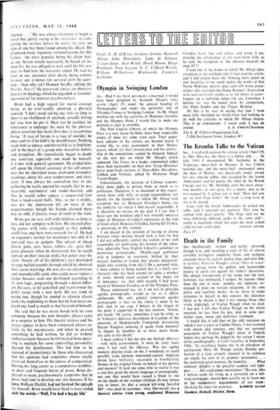Death in the Family
Sui,—Incoherently written and shrilly shrewish though it is. and revealing a view of life of almost enviable zoological simplicity (lions and pedigree creatures beset by jackals. prairie dogs and even fish, in kettles). Auheron Waugh's article (May 6) never- theless sprang from the gallant and honourable motive to speak out against his father's detractors. His abrupt introduction of my name into the text, however, was motivated, I suspect, by reasons other than the one at issue: namely, my opinions, ex- pressed in print on various occasions, of his own paltry and repellent books. As he chose to make reference to myself in this context, the inference likely to be drawn is that I was among those who wrote slightingly of Evelyn Waugh when he died. I was not. I felt that Evelyn Waugh on the whole received far less than his due, and, in some par- ticular cases, mean and malicious treatment I would like to add that on the only occasion on which I was a guest at Combe Florey, I was received with charm and courtesy, and that my personal assessment of Evelyn Waugh's place in English letters may perhaps be judged by the review I wrote of his autobiography, A Little Learning. in September 1964: 'Its excellence bastes one in an afterglow of satisfaction. Here Mr Waugh attains bloomy per- fection of a style severely classical in its cadences yet totally his own in its sardonic seriousness . . . the mellowed good humour, the humility. . . . What endlessly delights is the graceful candour and light- ness . . . this resplendent masterpiece.' His son, who I believe earns his living as a journalist on a left- wing newspaper, should now quickly try to learn one of the rudimentary requirements of our trade: checking his facts for accuracy. KENNETH ALISO. Gurneys, Halwea Hitchin, Herts.


































 Previous page
Previous page